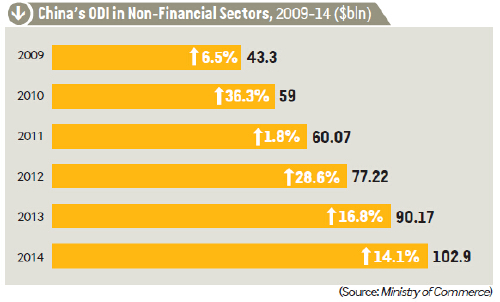|
"They will face many challenges and uncertainties when expanding overseas markets, including accelerating trade protectionism worldwide, an ever-changing international market, a lack of understanding toward the political and economic environment in investment destinations, poor access to financing channels and the shortage of a talent pool that's familiar with international business operations," Jiang said.
Wang Huiyao, Director General of the Center for China and Globalization, a non-profit think tank based in Beijing that conducts research on many global issues, agreed.
"Lack of trust with local stakeholders, fierce competition from local and Chinese counterparts and ignorance of the local regulatory and cultural environment have caused trouble in overseas investments and operations," Wang said. "It requires careful homework and cooperation with government, professional third-party agencies and qualified international talent to be a competent and responsible buyer."
Xing summarized the risks facing Chinese companies' overseas expansion as follows.
"First, there are risks caused by uncontrollable factors, such as natural disaster, religious conflict and war. Second, some risks occur because Chinese companies fail to adapt to local environment, have flawed internal control or have poor abilities to integrate local resources. Finally, there are trade protectionism laws specifically targeting Chinese companies or citizens, such as the deadly riots targeting Chinese people in Viet Nam last May and untenable allegations from the United States over national security concerns targeting Chinese companies," Xing said.
"Chinese companies can buy relevant insurance to reduce losses in case of the first type of risk. For the second type of risk, Chinese companies should improve their management standards and strengthen internal control in overseas markets. Industrial organizations can play their role in this respect, too, through methods like disciplining Chinese companies and preventing cutthroat competition among Chinese companies," Xing suggested.
"As for trade protectionism, I don't think any company is powerful enough to solve it. Companies concerned should report that to the Chinese Government and the issue should be solved in government-level bilateral talks," Xing said.
Email us at: zhouxiaoyan@bjreview.com

China's Major Overseas Investment Projects in 2014
January: Fosun International Ltd. acquired Portuguese insurance firm CaixaSeguros e Saude for 1 billion euro ($1.36 billion).
February: China's second largest vehicle producer Dongfeng Motor Corp. purchased a 14.1-percent stake in French automaker PSA Peugeot Citroen for 800 million euro ($1.09 billion).
February: Chinese grain trader COFCO Group bought a 51-percent stake in Dutch trader Nidera for $1.29 billion. In April, COFCO paid $1.5 billion for a 51-percent stake in Singapore's Noble Group Ltd.'s agribusiness. The Noble and Nidera deals mark the biggest overseas acquisitions in China's grain sector.
April: A Chinese consortium led by China Minmetals Corp. bought a giant Peruvian copper mine owned by Glencore Xstrata PLC for $5.85 billion.
July: China Life Insurance Co. Ltd. acquired the 10 Upper Bank Street office building in London for $1.35 billion.
July: State Grid Corp. acquired a 35-percent stake in Italy-based electric utility company CDP Reti Srl for $2.81 billion.
September: China's top locomotive maker CSR Corp. Ltd. invested $131 million in the construction of a manufacturing and maintenance center in Malaysia.
October: Lenovo Group purchased Motorola from Google in a $2.91-billion deal. | 